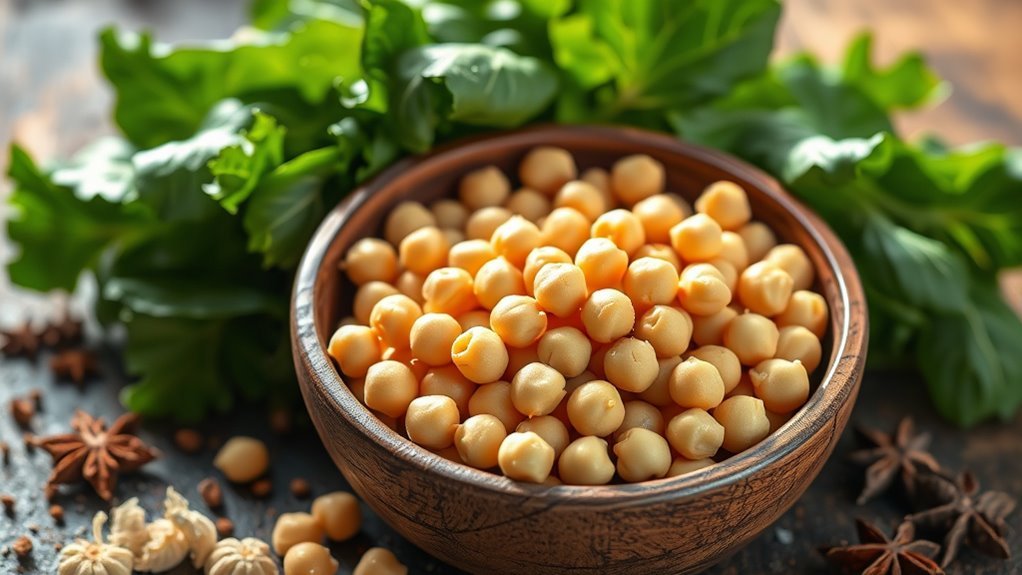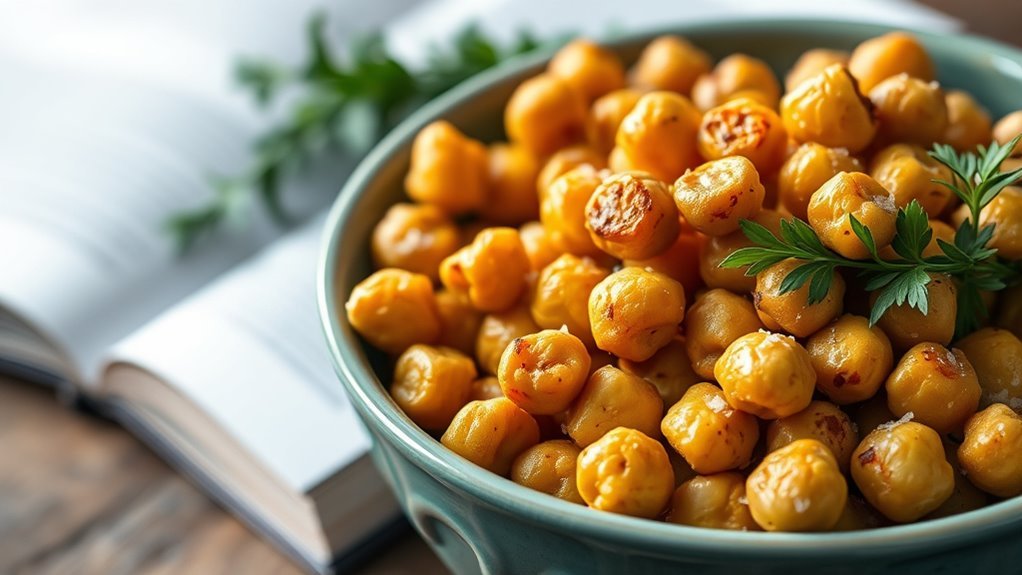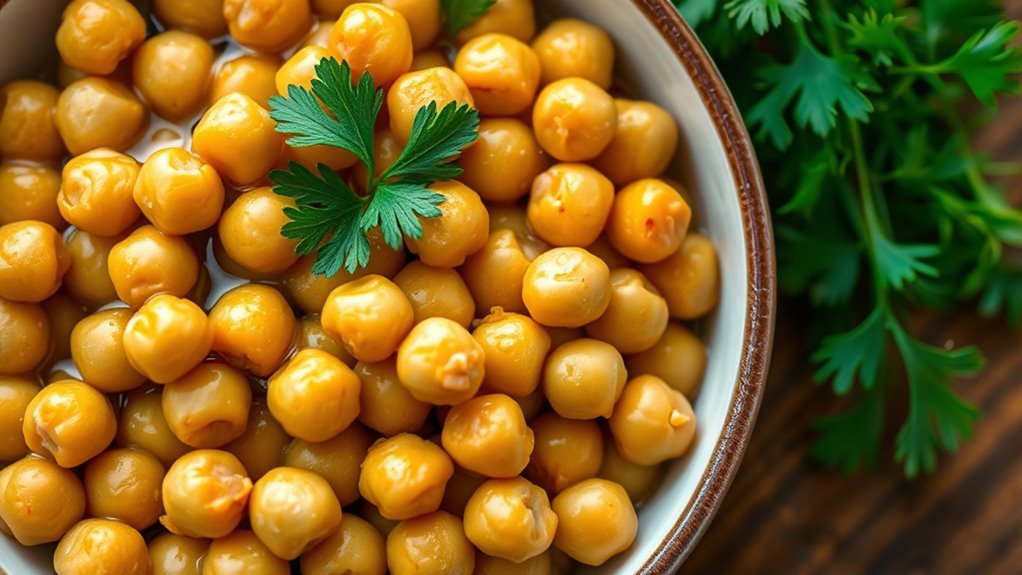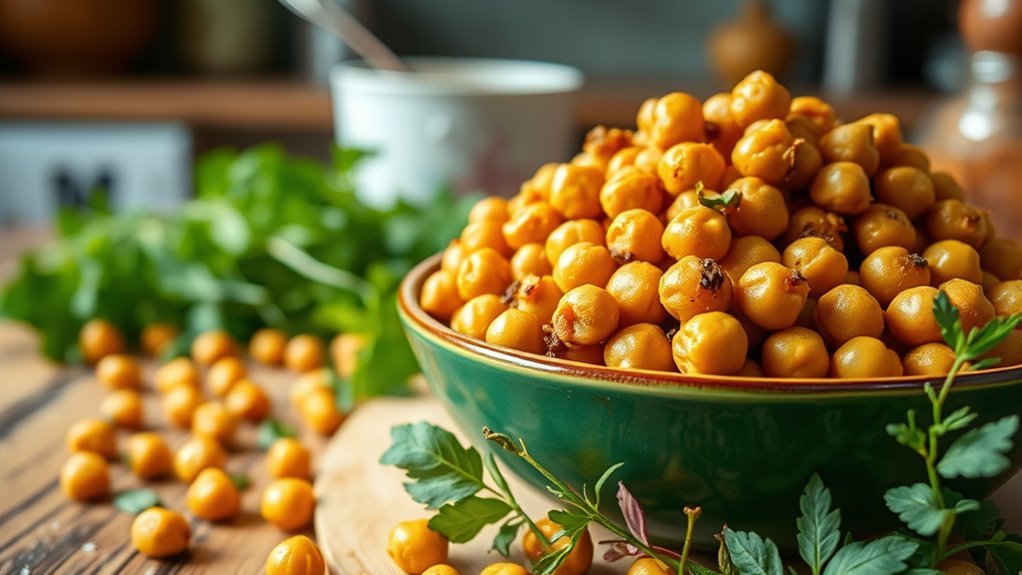Chickpeas aren’t considered keto-friendly because they contain a high amount of carbohydrates, which can disrupt ketosis if you eat too many. One cup has around 33 grams of net carbs, making moderation essential. While they offer protein and fiber benefits, it’s vital to monitor your daily carb allowance. If you’re looking for low-carb alternatives or ways to incorporate chickpeas into a low-carb diet, you’ll find some exciting options that might just surprise you.
Understanding the Ketogenic Diet

While many diets come and go, the ketogenic diet has gained popularity for its unique approach to weight loss and health improvement. At its core, keto principles focus on drastically reducing carbohydrate intake and increasing fats to trigger ketosis, a metabolic state where your body burns fat for fuel. This shift can lead to effective weight loss and improved energy levels. However, it is crucial to recognize that there are diet variations within the ketogenic framework, such as targeted or cyclic keto, which may suit different lifestyles and goals. Understanding these variations allows you to tailor the diet to fit your needs while enjoying the freedom to choose foods that work best for you, enhancing both satisfaction and adherence.
Nutritional Profile of Chickpeas

Chickpeas, often celebrated for their versatility and nutritional benefits, pack a powerful punch regarding macronutrients. They’re rich in protein, offering about 15 grams per cooked cup, which can support muscle health and keep you feeling satisfied. Additionally, chickpeas are an excellent source of fiber, contributing to digestive health and helping you maintain stable energy levels. You can enjoy their benefits through various chickpea recipes, from salads to hummus, providing a delightful way to incorporate them into your diet. These nutrient-dense legumes also contain essential vitamins and minerals, such as iron and magnesium, which are crucial for overall well-being. So, whether you’re looking to boost your meals or explore new flavors, chickpeas are a fantastic choice.
Carbohydrate Content in Chickpeas

One cooked cup of chickpeas contains approximately 45 grams of carbohydrates, making them a significant source of this macronutrient. When considering chickpea benefits, it’s essential to compare their carbohydrate content with other legumes and grains.
- Chickpeas offer a good balance of protein and fiber.
- They have a lower glycemic index than many grains.
- The high fiber content can aid digestion.
- They provide essential vitamins and minerals.
- Chickpeas can help keep you feeling full longer.
In carbohydrate comparison, while chickpeas are higher than some keto-friendly options, they also deliver nutritional value that might complement your diet. If you’re looking for plant-based protein, chickpeas could still be a worthwhile addition, depending on your dietary goals.
Impact of Chickpeas on Ketosis
If you’re aiming for a ketogenic diet, the impact of chickpeas on ketosis is worth considering due to their relatively high carbohydrate content. While chickpeas provide protein and fiber beneficial for digestion, their carb count could hinder ketosis maintenance if consumed in excess. Understanding how they fit into your daily carb allowance is essential.
Here’s a quick comparison of chickpeas and their effects:
| Nutrient | Chickpeas (1 cup) |
|---|---|
| Carbohydrates | 45g |
| Fiber | 12g |
| Protein | 15g |
| Fat | 4g |
| Net Carbs | 33g |
In moderation, chickpeas can be part of a balanced diet, but careful portioning is key to staying in ketosis.
Alternatives to Chickpeas for Keto
If you’re looking for keto-friendly alternatives to chickpeas, there are several options worth considering. Low-carb beans like black soybeans can provide similar textures, while various vegetables such as cauliflower can serve as great substitutes in recipes. Additionally, nut-based options like almond flour or ground walnuts can add a delicious twist to your meals without compromising your carb count.
Low-Carb Bean Options
While chickpeas are popular for their nutritional benefits, they may not fit into a strict keto diet due to their higher carbohydrate content. If you’re looking for low-carb legumes, consider these keto-friendly beans that can satisfy your cravings without derailing your diet:
- Black soybeans: Rich in protein and fiber, they’re a great alternative.
- Green beans: Low in carbs and versatile, perfect for stir-fries.
- Lentils: While slightly higher in carbs, they can be enjoyed in moderation.
- Edamame: Packed with protein and healthy fats, they’re an excellent snack.
- Peas: Though higher than others, they can be used sparingly for flavor.
Incorporating these alternatives can help you maintain a keto-friendly lifestyle while enjoying the flavors you love.
Vegetable Substitutes for Chickpeas
Although chickpeas are a nutritious option for many diets, they might not align with your keto goals due to their carbohydrate content. Fortunately, there are several vegetable varieties that can serve as excellent substitutes. Consider using cauliflower, which can be riced or mashed, offering a similar texture with considerably fewer carbs. Zucchini is another great option; it can be spiralized or grilled to create hearty dishes. Additionally, mushrooms provide a meaty flavor and are low in carbs, perfect for adding substance to your meals. Incorporating these low carb veggies not only keeps your meals aligned with keto principles but also adds diverse flavors and nutrients to your diet, giving you the freedom to enjoy satisfying and delicious meals.
Nut-Based Alternatives
When seeking keto-friendly alternatives to chickpeas, nut-based options can be a game-changer for your meals. These alternatives not only fit into your low-carb lifestyle but also add flavor and nutrition. Here are some great nut-based substitutes:
- Almonds: High in healthy fats and protein, they make excellent snacks.
- Cashews: Creamy and versatile, perfect for sauces or dips.
- Pecans: Rich in antioxidants, great for salads or as toppings.
- Walnuts: Excellent source of omega-3 fatty acids, ideal for baking.
- Nut Butter: Use almond or cashew butter in smoothies or as a spread.
You can also enjoy unsweetened almond milk, which is low in carbs and a fantastic base for smoothies or coffee, keeping your meals keto-friendly.
Incorporating Chickpeas in a Low-Carb Diet
Incorporating chickpeas into a low-carb diet can be tricky, given their higher carbohydrate content compared to other legumes. However, you can still enjoy chickpeas by using them strategically. Consider trying chickpea recipes that focus on moderation. For instance, using small amounts in salads or soups can add flavor without overwhelming your carb count. You might also explore low carb snacks made with chickpea flour, like chickpea crackers, which can be a satisfying alternative. If you’re craving something hearty, blending chickpeas into dips can provide a creamy texture while balancing your overall intake. By being mindful of portion sizes, you can find a way to incorporate chickpeas into your meals while staying aligned with your low-carb goals.
Health Benefits of Chickpeas
Chickpeas offer a wealth of health benefits that make them a valuable addition to your diet, especially if you’re looking for nutrient-dense foods. Packed with chickpea nutrition, they can help support your overall well-being. Here are some notable health benefits:
- High in Protein: Great for muscle maintenance and repair.
- Rich in Fiber: Supports digestive health and helps regulate blood sugar levels.
- Loaded with Vitamins: Contains essential vitamins like B6 and folate.
- Heart Health: May lower cholesterol levels and reduce heart disease risk.
- Antioxidant Properties: Helps combat oxidative stress in your body.
Incorporating chickpeas into your meals can enhance your nutrition while providing numerous health benefits, making them a smart choice for a balanced diet.
Final Thoughts on Chickpeas and Keto
When considering chickpeas in a keto diet, it is crucial to analyze their nutritional profile, especially their carb content. While they offer numerous health benefits, you might find alternative options that better fit your low-carb goals. Evaluating both the pros and cons can help you make an informed decision about including them in your meals.
Nutritional Profile Analysis
The nutritional profile of chickpeas reveals a complex relationship with the ketogenic diet. While they offer valuable nutrients, their carbohydrate content can make them less ideal for strict keto followers. Here are some key points to take into account:
- Carbohydrate Content: Chickpeas contain about 27 grams of carbs per cup.
- Fiber: They’re rich in fiber, promoting digestive health.
- Protein: A good plant-based protein source, essential for muscle maintenance.
- Vitamins and Minerals: High in folate, iron, and magnesium.
- Versatility: Chickpeas can be used in various chickpea recipes or transformed into keto snacks when prepared thoughtfully.
Ultimately, if you’re looking to enjoy chickpeas on a keto diet, moderation and careful meal planning are essential.
Alternative Options Available
For those adhering to a ketogenic diet, exploring alternative options to chickpeas can help maintain low carbohydrate intake while still enjoying delicious, nutrient-rich foods. Consider using chickpea substitutes like cauliflower, which is not only low in carbs but also versatile in recipes. Other low carb legumes, such as black soybeans, offer a great option for those seeking a protein-packed alternative. Edamame is another fantastic choice, providing healthy fats and fiber without the carbs. You can also try lentils in moderation, though they’re higher in carbs than other options. By incorporating these substitutes, you can enjoy satisfying meals without compromising your keto goals. Experimenting with these alternatives can open up new culinary avenues while keeping your carb count in check.
Frequently Asked Questions
Can I Eat Chickpeas on a Strict Keto Diet?
You can’t really eat chickpeas on a strict keto diet due to their higher carb content. Instead, consider chickpea alternatives like black soybeans or green beans, which are lower in carbs. These low-carb legumes can help you maintain your keto goals. Always remember to track your macros and choose options that align with your dietary needs. There are plenty of delicious alternatives that can keep your meals satisfying and keto-friendly!
How Many Chickpeas Can I Consume Without Affecting Ketosis?
To maintain ketosis, you should limit chickpea servings to about 1-2 tablespoons per day. This small amount helps minimize carbs while still allowing you to enjoy their nutritional benefits. Consuming more than this could disrupt ketosis effects, as chickpeas are relatively high in carbs. Always monitor your overall carb intake and adjust accordingly, so you can enjoy some variety in your diet without sacrificing your keto goals.
Are Canned Chickpeas More Carb-Heavy Than Dried Ones?
Canned chickpeas can be slightly more carb-heavy than dried ones, mainly due to added preservatives and sodium. Canned nutrition often includes extra ingredients that can increase carbohydrate content. On the other hand, dried benefits include having more control over what you add, allowing for a lower carb option. If you’re watching your carb intake, it’s wise to check labels and consider portion sizes, especially with canned varieties.
Do Chickpeas Have Any Hidden Sugars?
Chickpeas contain minimal hidden sugars, with only about 1 gram of sugar per 100 grams, making them a nutritious choice. In fact, their high fiber content contributes to their low glycemic index, promoting better blood sugar control. When exploring chickpea nutrition, you’ll find they’re rich in protein and essential vitamins. So, if you’re looking to enjoy their benefits without worrying about sugar content, chickpeas can be a great addition to your meals!
Can Chickpeas Be Part of a Keto Meal Prep?
Chickpeas can be tricky in keto meal prep due to their higher carb content. While they offer great nutrition, like protein and fiber, they might not fit into a strict keto diet. If you’re looking for keto alternatives, consider options like cauliflower or zucchini, which are lower in carbs but still provide bulk and nutrients. Balancing your meals is key, so always check your overall carb intake when incorporating chickpeas.
1. Are chickpeas low in carbohydrates?
2. Can chickpeas fit into a modified keto diet?
3. What are the nutritional benefits of chickpeas?
4. Are there keto-friendly alternatives to chickpeas?
5. How can I enjoy chickpeas while on a keto diet?
References
- https://www.healthline.com/nutrition/chickpeas-keto-friendly
- https://www.ncbi.nlm.nih.gov/pmc/articles/PMC5412502/
- https://www.webmd.com/diet/health-benefits-chickpeas
- https://www.medicalnewstoday.com/articles/323204
- https://www.eatright.org/health/wellness/preventing-illness/the-health-benefits-of-chickpeas
- https://www.researchgate.net/publication/326772740_Chickpea_Cicer_arietinum_L_A_Review_of_its_Health_Benefits_and_Nutritional_Value
- https://www.verywellfit.com/chickpeas-and-the-keto-diet-5078038


